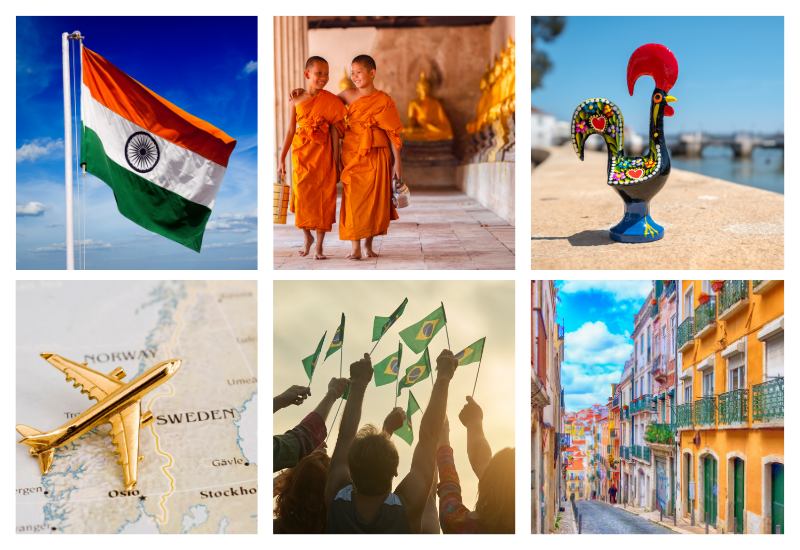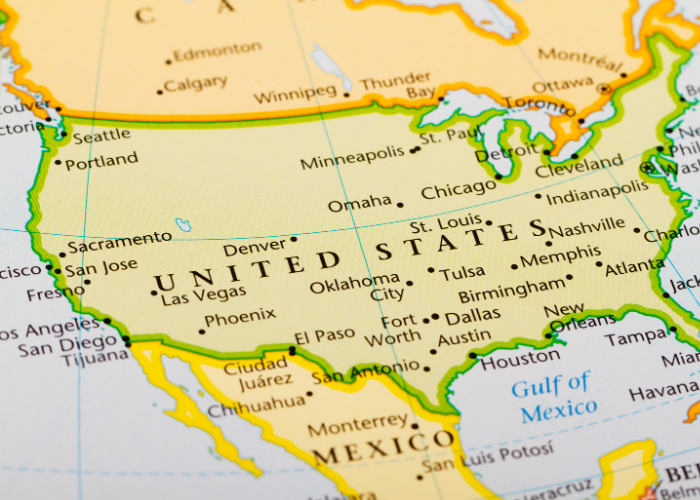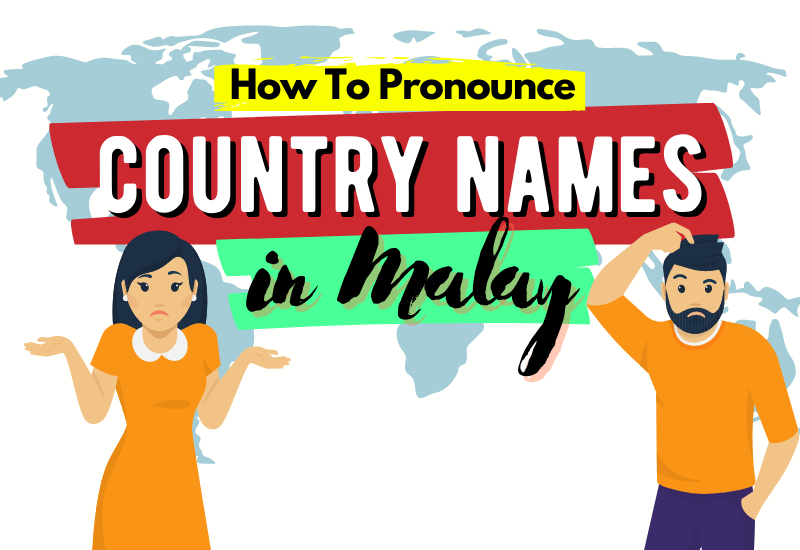Bahasa Malaysia is considered one of the easiest languages to learn; the language is straightforward, non-complex, and imbued with finesse and grace. Apart from its basic greetings, pronouns, and question words, as a Malay language learner, you must acquire the vocabulary of the Malay language. This is the perfect place to be if you have struggled before, wondering how to pronounce certain country names in Malay. In today’s blog, we’ll look at the translations for country names such as Canada, the Philippines, and Japan in the Malay language and how to pronounce them.
How Do I Pronounce Country Names In Malay?
As we go through some important tips on how to pronounce country names in Malay correctly, you might want to know that many countries are spelled and pronounced as exactly as they were in English. Some others are spelled differently when translated to English, and some just sound different. Still, it’s very easy to learn and understand the correct steps on how to pronounce country names in the Malay language. To start, let’s look at the names of some countries that remain the same in terms of their spelling and pronunciation even when they’ve been translated to Malay.

Country names like India, Thailand, Portugal, Sweden, and Brazil are pronounced exactly like English. The English name of the country Sweden still remains as Sweden when translated to Bahasa Melayu. Try listening to Malaysian local news and you’ll find out that even in the Malay language, the pronunciation of these countries is precisely identical to those of English.
Yet, one aspect that really distinguishes the sound of country names when articulated in Malay is the vocal sounds. The table shows some of the countries that share a common way of spelling in English but sound slightly different when spoken in Malay:
| COUNTRY NAME | IPA TRANSCRIPTION | PRONUNCIATION (MALAY) | EXPLANATION |
| India | ˈɪndiə | ɪndiɑ | Malay is a very easy, straightforward language. The pronunciation of each syllable is according to its vowel. So usually, for country names ending with A, the sound is /ɑ/ |
| Brazil | brəˈzɪl | brɑˈzɪl | Replace /ə/ sound with /ɑ/ |
| Thailand | ˈtaɪˌlænd | ˈtaɪˌlænd | Same as English |
| Vietnam | viˌɛtˈnɑm | viˌɛtˈnɑm | Same as English |
| Kazakhstan | ˌkɑzɑkˈstɑn | kɑzɑkˈstɑn | Same as English |
| Korea | kɔˈriə | kɔˈriɑ | Replace /ə/ sound with /ɑ/ |
| Pakistan | ˈpækɪˌstæn | ˈpɑkɪˌstɑn | Replace /æ/ sound with /ɑ/ |
| Portugal | ˈpɔrʧəgəl | ˈpɔrtugɑl | Replace /ə/ sound with /u/ and /ɑ/ |
| Slovakia | ˌsloʊˈvɑkiə | sloʊˈvɑkiɑ | Replace /ə/ sound with /ɑ/ |
| Sri Lanka | sri ˈlæŋkə | sri ˈlæŋkɑ | Replace /ə/ sound with /ɑ/ |
| Sudan | suˈdæn | suˈdɑn | Replace /æ/ sound with /ɑ/ |
| Sweden | ˈswidən | ˈswidən | Same as English |
| Nigeria | naɪˈʤɪriə | naɪˈʤɪriɑ | Replace /ə/ sound with /ɑ/ |
| Bangladesh | ˈbæŋləˌdɛʃ | ˈbæŋlɑˌdɛʃ | Replace /ə/ sound with /ɑ/ |
| Mexico | mɛksəˌkoʊ | mɛksiˌkoʊ | Replace /ə/ sound with /i/ |
| Iran | ɪˈrɑn | ɪˈrɑn | Same as English |
| United Kingdom | juˈnaɪtəd ˈkɪŋdəm | juˈnaɪtəd ˈkɪŋdəm | Same as English |
| Myanmar | mjɑnˈmɑr | mjɑnˈmɑr | Same as English |
| Colombia | kəˈlʌmbiə | koˈlombiɑ | Pronounce the vowel O with an /o/ sound and replace /ə/ sound with /ɑ/ |
| Ukraine | juˈkreɪn | juˈkreɪn | Same as English |
| Tanzania | tænˈzeɪniə | tɑnˈzɑniɑ | All A vowels pronounced with /a/ sound |
| Kenya | ˈkɛnjə | ˈkɛnjɑ | Replace /ə/ sound with /ɑ/ |
| Argentina | ɑrʤənˈtinə | ɑrʤənˈtinɑ | Replace /ə/ sound with /ɑ/ |
| Algeria | ælˈʤɪriə | ɑlˈʤɪriɑ | Replace /æ/ and /ə/ sound with /ɑ/ |
| Iraq | ɪˈrɑk | ɪˈrɑk | Same as English |
| Uganda | juˈgændə | uˈgɑndɑ | The U letter is pronounced as /u/, not /ju/ Replace /ə/ sound with /ɑ/ |
| Poland | ˈpoʊlənd | ˈpoʊlənd | Same as English |
| Peru | pəˈru | pəˈru | Same as English |
| Uzbekistan | uzˈbɛkɪˌstæn | uzˈbɛkɪˌstɑn | Replace /æ/ sound with /ɑ/ |
| Venezuela | ˌvɛnɪˈzweɪlə | vɛnɪˈzweɪlɑ | Replace /ə/ sound with /ɑ/ |
| Nepal | nəˈpɔl | neɪ pɔl | Replace /ə/ sound with /eɪ/ |
| Afghanistan | æfˈgænəˌstæn | ɑfˈgɑnəˌstɑn | Replace /æ/ sound with /ɑ/ |
| Ghana | ˈgænə | ˈgɑnɑ | Vowels A pronounced /a/ |
| Yaman | jəmən | jɑmʌn | Replace /ə/ sound with /ɑ/ |
| Mozambique | ˌmoʊzæmˈbik | ˌmoʊzɑmˈbik | Replace /æ/ sound with /ɑ/ |
| Australia | ɔˈstreɪljə | ɔˈstrɑljɑ | Replace /ə/ sound with /ɑ/ |
| Syria | ˈsɪriə | ˈsɪriɑ | Replace /ə/ sound with /ɑ/ |
| Cameroon | ˈkæməˌrun | ˈkæməˌrun | Same as English |
| Sri Lanka | sri ˈlæŋkə | sri ˈlɑŋkɑ | Replace /æ/ and /ə/ sound with /ɑ/ |
| Romania | roʊˈmeɪniə | roʊˈmɑniɑ | Replace /eɪ/ and /ə/ sound with /ɑ/ |
| Chile | ˈʧɪli | ˈʧɪli | Same as English |
| Malawi | məˈlɑwi | mɑˈlɑwi | Replace /ə/ sound with /ɑ/ |
| Ecuador | ˈɛkwəˌdɔr | ˈɛkwɑˌdɔr | Replace /ə/ sound with /ɑ/ |
Now, we’ll see what are the countries that have slight differences in their spelling and pronunciation when translated to Malay. These country names usually sound more or less the same as their English counterparts, but some have apparent changes in how you pronounce them.
| COUNTRY NAME (ENGLISH) | IPA TRANSCRIPTION | SPELLING (MALAY) | PRONUNCIATION (MALAY) | EXPLANATION |
| China | ˈʧaɪnə | China | chee-nə | The “chi” in China is articulated as ˈʧaɪnə but in Malay, it’s ʧinə (chee-nə) rather than (chai-nə) |
| Indonesia | ɪndoʊˈniʒə | Indonesia | indone-see ya | The correct pronunciation for Malay is when the ʒə sound is substituted with an /s/ sound (indone-see ya) |
| Malaysia | məˈleɪʒə | Malaysia | malay-see ya | the ʒə sound is substituted with an /s/ sound (malay-see ya) |
| Russia | ˈrʌʃə | Rusia | ru-see ya | In Malay, the vocal ‘u’ in ‘ru’ is exactly pronounced with an /u/ sound. So, it’s /ru/, instead of /rʌ/ The ʒə sound is substituted with an /s/ sound (ru-see ya) |
| Italy | ˈɪtəli | Itali | ɪtɑli | The /ə/ sound after t is pronounced with an /ɑ/ – (itɑli, not ɪtəli) |
| Canada | ˈkænədə | Kanada | kɑnɑdɑ | In Malay, the /k/ sound is mostly spelled with the letter K and it’s pronounced with a straight /a/ sound (like in the word ‘are’) – kɑ-nɑ-dɑ |
| Africa | ˈæfrəkə | Afrika | ɑfrɪkɑ | The æ sound in front and the ə at back is replaced with /ɑ/ – (ɑf-rɪkɑ) |
| German | ˈʤɜrmən | Jerman | ˈʤɜrmən | /ʤ/ sound in Malay is represented through J. |
| Saudi Arabia | ˈsɔdi əˈreɪbiə | Arab Saudi | ɑrʌb saʊdi | In Malay, the word arrangement of Saudi Arabia is inverted – Arab precedes Saudi. The word Arab is also pronounced a bit different – (are-rub) |
How To Pronounce America In Malay?

How about countries like Japan, France, and the U.S.? Do they still remain in the same form as the countries before? Well, there’s only one way to find out. Country names such as America, Japan, Turkey, and Spain may sound similar to English when translated to Malay.
United States of America = Amerika Syarikat
First of all, in Malaysia, you’ll find that most words with a /k/ sound will come from the letter ‘K’. So, it’s common to see any word with the alphabet ‘C’ to be substituted with ‘K’ when it is translated to Malay – hence the spelling of Amerika. Some other examples of this specific rule are rak (rack), kek (cake) and Kanada (Canada).
However, you don’t go around applying this rule on every word with a ‘C’ as it’s indefinite. So, the one best way for you to know the correct spelling of a country name or any word in Malay is to learn and understand every part of Bahasa Malaysia, especially vocabulary.
Japan = Jepun (ʤəpoʊn)
The name for Japan in Malay does seem similar to its English version. However, to pronounce this country name the correct way in Bahasa Malaysia, you have to know what it sounds like. The sound of the initial syllable of the word remains the same, even in Malay, that is ʤə. For the latter part, it is pronounced poʊn (like the phone but with P in front). There you go! Now you sound exactly like a native Malay speaker!
Turkey = Turki
Like Japan, the name of this country also seems to be identical to its English spelling. This one, unlike Japan, is pronounced differently in its first syllable, which is “tur”. The “key” sound is exactly the same in both English and Malay. In Malaysia, the correct articulation for the country Turkey is /turki/. Yup, it sounds precisely as how it is written, that’s the beauty and convenience of the Malay language! Many (almost all) Malay words are enunciated based on each syllable. If you’re having a hard time figuring out how does “tur” sounds, imagine saying the word ‘too’ and add an R at the back.
Philippines = Filipina
To those who are non-natives to the Malay language, the name of this country is easy to articulate. The only difference in terms of how it sounds is at its final syllable – instead of saying /pinz/, in Malay, it’s verbalized as /pinɑ/.
Now the time has come to the most interesting part of today’s blog – these country names sound totally different from the ones you hear in English. Egypt, France, Spain, and the Netherlands are all written and spoken differently when translated to Malay.
If you’ve known or studied Arabic before, you’d already know that Mesir originated from the Arabic language. For your information, Bahasa Malaysia borrows many terms and words from Arabic. In this case, the Arabic word ‘Mesir’ is borrowed and used to refer to the same country, Egypt. Other country names like France, Spain, and the Netherlands are translated as Perancis, Sepanyol, and Belanda due to the deep historical events of Malaysia. If you want to know more about how to pronounce the names of these countries, try to look up the history of Malaysia with all these countries.
| ENGLISH | MALAY |
| Egypt | Mesir |
| France | Perancis |
| Spain | Sepanyol |
| Netherlands | Belanda |
Learn More About Malaysia
After today’s blog post, you must now understand how every term or name coined in a language deeply relies on the historical events of a country. So, if you’re interested to find out about Malaysia, start your discovery by learning its language! Learn the Malay language at Ling App, where you’ll get free access to learn Malay words, pronunciation, sentences, vocabulary and so much more!



































































